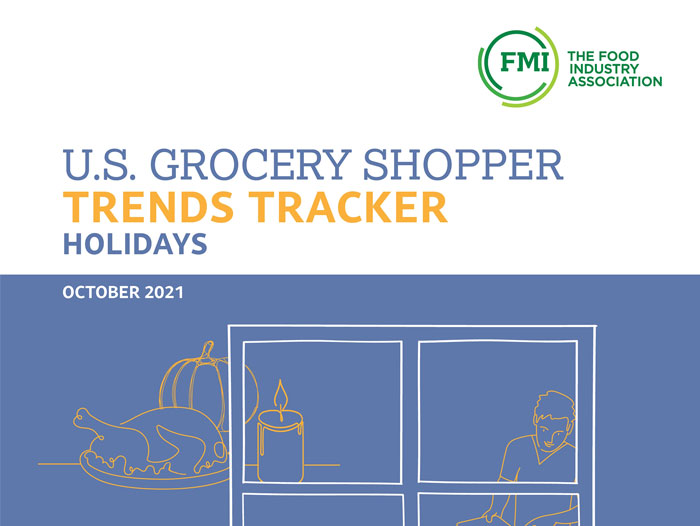New FMI Report Reveals Positive Attitude Among Grocery Shoppers Ahead of Holiday Celebrations
November 9, 2021 | 3 min to read

ARLINGTON, Va.–FMI—The Food Industry Association today releases its U.S. Grocery Shopper Trends Tracker: Holidays, a comprehensive report on the impact of COVID-19 on U.S. grocery shopper perceptions and behaviors heading into the busy holiday season. The report finds that despite concerns surrounding the availability and cost of favorite holiday foods due to lingering post-pandemic supply chain and inflation issues, most shoppers plan to celebrate the holidays much the same as they did before the pandemic, albeit while shopping early and observing relaxed but persistent social distancing measures when getting together with friends and family.
“Consumers remain aware of pandemic impacts on the supply chain, but most are confident that with some planning they will find their favorite foods at reasonable prices and share traditional menu with loved ones this holiday season,” said Leslie G. Sarasin, president and CEO of FMI. “Both grocers and consumers have demonstrated tremendous resilience over the last year, and shoppers are excited about a cautious return to normalcy for their holiday gatherings this year.”
The report reveals that while 58% of shoppers expressed some concern about being able to purchase groceries they need for holiday meals, that sentiment hasn’t changed since the summer, suggesting that consumers aren’t overly concerned with reports of product shortages this winter. To mitigate potential supply chain issues, 18% of shoppers indicate they will plan further in advance when shopping for their Thanksgiving meals this year than they usually would.
Despite concerns about inflation, average household grocery spending has held steady at about $144 per week, which is down from the $161 per week witnessed at the height of the pandemic last year.
While most shoppers said they expect to celebrate the holidays the same as before the pandemic, roughly half of shoppers say that COVID-19 will have an impact on how they celebrate upcoming holidays, with some noting they plan to hold smaller gatherings, watch events like sports and parades from home, and enforce social distancing rules.
The report also finds that 76% of shoppers were satisfied with their primary grocery store’s response to the pandemic, with over half of shoppers trusting their primary food store for helping them stay healthy. Learn more at www.FMI.org/GroceryTrends.
ABOUT FMI
As The Food Industry Association, FMI works with and on behalf of the entire industry to advance a safer, healthier and more efficient consumer food supply chain. www.FMI.org
